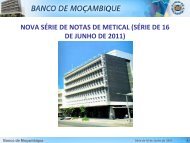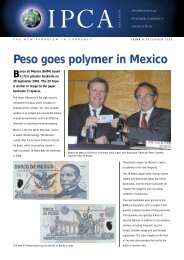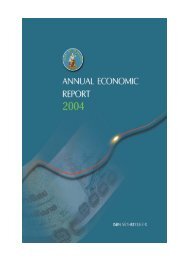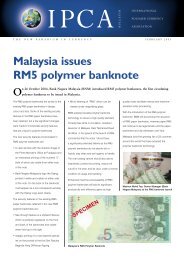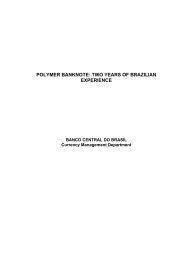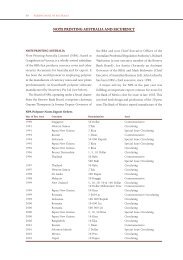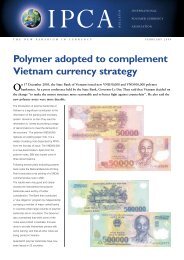ANNUAL REPORT 2008 - Polymer Bank Notes of the World
ANNUAL REPORT 2008 - Polymer Bank Notes of the World
ANNUAL REPORT 2008 - Polymer Bank Notes of the World
You also want an ePaper? Increase the reach of your titles
YUMPU automatically turns print PDFs into web optimized ePapers that Google loves.
commodity prices (see Box 4). Conversely, <strong>the</strong>subsequent rapid decline in HICP inflation, to1.6% by <strong>the</strong> end <strong>of</strong> <strong>the</strong> year, resulted from <strong>the</strong>strong decline in crude oil prices and reductionsin <strong>the</strong> prices <strong>of</strong> a broad range <strong>of</strong> o<strong>the</strong>r globalcommodities, including food, plus a favourablebase effect, in a context <strong>of</strong> rapidly deterioratingeconomic activity.Box 4COMMODITY PRICES AND HICP INFLATIONThe prices <strong>of</strong> a broad range <strong>of</strong> commoditiesrose sharply in <strong>the</strong> period between <strong>the</strong> start <strong>of</strong>2005 and July <strong>2008</strong> (see Chart A). They havedeclined rapidly since <strong>the</strong>n, amid <strong>the</strong> markeddeterioration in global economic activity.These developments – in particular those in oiland food prices – have had a major bearing onconsumer prices in <strong>the</strong> euro area and largelyexplain <strong>the</strong> spike in overall HICP inflationin <strong>2008</strong>. This box reviews <strong>the</strong> effects <strong>of</strong>commodity prices on euro area inflation. 1Direct and indirect effectsChart A Commodity prices(monthly data in euro; index: 2000 = 100)300250200150100food and tropical beveragesmetalsoil300250200150100Commodity price increases affect HICPinflation directly through <strong>the</strong>ir immediateeffect on <strong>the</strong> consumer prices <strong>of</strong> energy andfood, which represent almost 30% <strong>of</strong> <strong>the</strong>overall HICP. They may also have an indirect effect on consumer prices through producer prices,as firms facing higher input costs pass <strong>the</strong>se cost increases on to sales prices in order to maintainor restore <strong>the</strong>ir pr<strong>of</strong>it margins.The extent to which cost increases are passed on to fur<strong>the</strong>r stages <strong>of</strong> production and to consumersdepends on several factors, including competitive pressures in <strong>the</strong> market and business cycleconditions. As cost shocks take time to work through <strong>the</strong> supply chain, indirect effects aregenerally thought to materialise with longer time lags and to last longer than direct effects.Turning to <strong>the</strong> data, most <strong>of</strong> <strong>the</strong> increase in headline HICP inflation from August 2007 was dueto <strong>the</strong> direct and indirect effects <strong>of</strong> <strong>the</strong> commodity price shock. In line with this, processed andunprocessed food and energy prices – <strong>the</strong> HICP components more directly exposed to <strong>the</strong> shock –rose substantially up to July <strong>2008</strong>, whereas measures <strong>of</strong> inflation excluding food and energyremained largely unchanged over <strong>the</strong> period (see Chart B).Indirect effects also appeared to emerge in o<strong>the</strong>r HICP components that use oil and raw food asa production input. For example, within <strong>the</strong> services component, <strong>the</strong> prices <strong>of</strong> transport-relatedservices, package holidays and restaurants – which use oil and food as production inputs – rose502000 2001 2002 2003 2004 2005 2006 2007<strong>2008</strong>Sources: Hamburg Institute <strong>of</strong> International Economics and ECBcalculations.501 See <strong>the</strong> article entitled “Oil prices and <strong>the</strong> euro area economy” and <strong>the</strong> box entitled “Recent oil price developments and <strong>the</strong>ir impact oneuro area prices” in <strong>the</strong> November 2004 and July 2004 issues <strong>of</strong> <strong>the</strong> ECB’s Monthly Bulletin respectively.ECBAnnual Report<strong>2008</strong>55



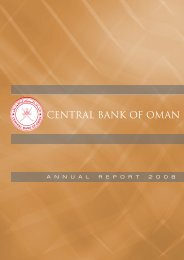
![KNOW YOUR NEW GIBRALTAR BANKNOTES - [Home] bThe/b](https://img.yumpu.com/50890985/1/184x260/know-your-new-gibraltar-banknotes-home-bthe-b.jpg?quality=85)
![PAPUA NEW GUINEA - [Home] - Polymer Bank Notes of the World](https://img.yumpu.com/49758743/1/190x143/papua-new-guinea-home-polymer-bank-notes-of-the-world.jpg?quality=85)

